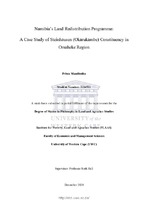| dc.contributor.advisor | Hall, Ruth | |
| dc.contributor.author | Mandimika, Prisca | |
| dc.date.accessioned | 2021-04-09T08:19:57Z | |
| dc.date.available | 2021-04-09T08:19:57Z | |
| dc.date.issued | 2020 | |
| dc.identifier.uri | http://hdl.handle.net/11394/8173 | |
| dc.description | Magister Philosophiae (Land and Agrarian Studies) - MPhil(LAS) | en_US |
| dc.description.abstract | As a means to assuage historical land inequities, resultant socio-economic disparities and poverty alleviation, the Namibian Government undertook to reform the land sector. Guided by the Constitution and the Resolutions of the 1991 Land Conference policy and legal framework, a fractured consensus is built on the rationale to redistribute land to a targeted group. Parallel to the reform agenda, systemic challenges to the resettlement process are growing amid questions on Government’s ability to respond to sustainable programme objectives embedded within land reforms. Literature coalesces on the issues of land-reform programmes having lost direction, being skewed in favour of a few, being biased towards commercial agriculture, and requiring review and re-configuration to be inclusive and to satisfy equity and poverty-alleviation concerns. | en_US |
| dc.language.iso | en | en_US |
| dc.publisher | University of Western Cape | en_US |
| dc.subject | Land reform | en_US |
| dc.subject | Beneficiary selection | en_US |
| dc.subject | Resettlement | en_US |
| dc.subject | livelihoods | en_US |
| dc.subject | Selection criteria | en_US |
| dc.subject | Small-scale farmers | en_US |
| dc.title | Namibia’s land redistribution programme: A case study of Steinhausen (Okarukambe) constituency in Omaheke region | en_US |
| dc.rights.holder | University of Western Cape | en_US |

